
Chill Out is an album by reggae band Black Uhuru, released in 1982. The album was recorded at Channel One Studios in Jamaica and produced by Sly and Robbie. Featuring The Revolutionaries, an influential session group, Chill Out, together with its dub companion The Dub Factor, is widely considered a classic of reggae music.
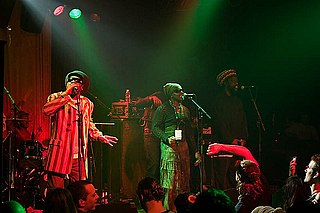
Black Uhuru is a Jamaican reggae group formed in 1972, initially as Uhuru. The group has undergone several line-up changes over the years, with Derrick "Duckie" Simpson as the mainstay. They had their most successful period in the 1980s, with their album Anthem winning the first ever Grammy Award for Best Reggae Album in 1985.
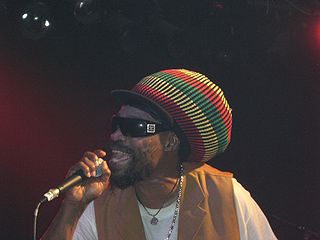
Michael Rose is a Jamaican reggae singer. He is most widely known for a successful tenure as the lead singer for Black Uhuru from 1977 to 1984, followed by a lengthy solo career. He has been praised as "one of Jamaica's most distinguished singers" and for launching a distinctive form of reggae singing that originated in his home neighborhood of Waterhouse in Kingston.

Guess Who's Coming to Dinner is a reggae album and single by Black Uhuru. The album was first released under the title Showcase in 1979, then as a re-edition entitled Black Uhuru in 1980, with the addition of "Shine Eye Gal", and with different mixes of the original LP tracks The Guess Who's Coming to Dinner release, from 1983, is identical to the 1980 edition.
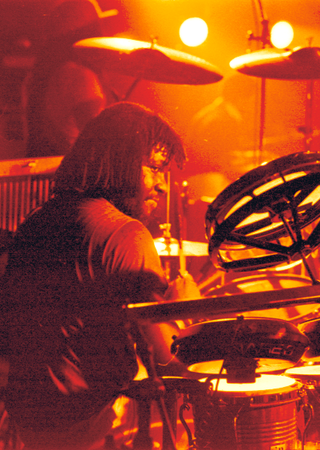
Sly and Robbie were a prolific Jamaican rhythm section and production duo, associated primarily with the reggae and dub genres. Drummer Sly Dunbar and bassist Robbie Shakespeare teamed up in the mid-1970s after establishing themselves separately in Jamaica as professional musicians. Shakespeare died in December 2021 following kidney surgery.

Tyrone Downie was a Jamaican keyboardist and pianist best known for his involvement as a member of Bob Marley and The Wailers.

Earl "Chinna" Smith, a.k.a. Earl Flute and Melchezidek the High Priest, is a Jamaican guitarist active since the late 1960s. He is most well known for his work with the Soul Syndicate band and as guitarist for Bob Marley & the Wailers, among others, and has recorded with many reggae artists, appearing on more than 500 albums.
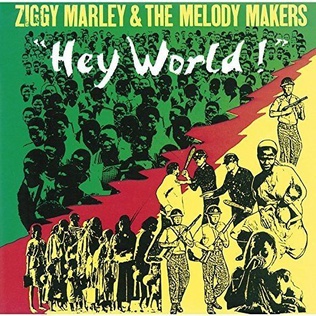
Hey World! is the second album by Ziggy Marley and the Melody Makers, released in 1986.
Delroy "Junior" Reid is a Jamaican reggae and dancehall musician, best known for his featuring on the songs "One Blood", "It's Okay " and "This Is Why I'm Hot", as well as being the lead vocalist for Black Uhuru on three albums: Brutal, Positive and Black Uhuru Live in New York.

A Luta Continua is a studio album by the Jamaican musician Big Youth, released in 1985. The title track is about the fight to end apartheid. Jonathan Demme was inspired to use the phrase in the credits of his movies Something Wild and Married to the Mob.

Sinsemilla is the third album by Jamaican reggae band Black Uhuru, released in 1980 on the Island Records subsidiary Mango. The album helped the band achieve a global fanbase.
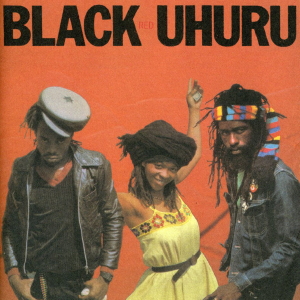
Red is a 1981 album by the Jamaican reggae band Black Uhuru. The line-up of the band changed many times during its 16 years and this is the second release for the lineup of Michael Rose, Sandra "Puma" Jones and Derek "Duckie" Simpson. Sly & Robbie were again in the production seat after having previously worked with the band on the 1980 album Sinsemilla.

Right Time is the 1976 studio album debut of influential reggae band the Mighty Diamonds. The album, released by Virgin Records after they signed the Mighty Diamonds following a search for talent in Jamaica, is critically regarded as a reggae classic, a landmark in the roots reggae subgenre. Several of the album's socially conscious songs were hits in the band's native Jamaica, with a few becoming successful in the UK underground. Influential and sometimes unconventional, the album helped secure the success of recording studio Channel One Studios, and rhythm team Sly Dunbar and Robbie Shakespeare.

Anthem is an album by Black Uhuru, released in the US in 1983 and internationally in 1984. In 1985, it won the first Grammy Award for Best Reggae Recording. It has been released in three editions, each with a different track listing and mix, and as a box set.

Private Beach Party is a 1985 studio album by the Jamaican reggae singer Gregory Isaacs. The album continued Isaacs' working relationship with producer Augustus "Gussie" Clarke, to whom he would return in 1988 for the hugely successful "Rumours" and Red Rose for Gregory. Clarke employed Carlton Hines to write several of the songs on the album, and the musicians featured include Sly Dunbar, Robbie Shakespeare, Lloyd Parks, and Willie Lindo.

Rhythm Killers is an album by Jamaican musical duo Sly and Robbie, released in May 1987 by Island Records. By the time of the album's recording, Sly and Robbie had transitioned away from their prolific work in the reggae genre. They spent the 1980s experimenting with electronic sounds and contemporary recording technology on international, cross-genre endeavors, which influenced their direction for Rhythm Killers.

Brutal is a studio album by the Jamaican reggae band Black Uhuru. It was released in 1986 through Real Authentic Sound, making it their first album on the label. Audio production was handled by Doctor Dread, Arthur Baker, Steven Stanley and Black Uhuru. The album peaked at number 36 in New Zealand, number 73 in the Netherlands, and was nominated for Grammy Award for Best Reggae Recording at 29th Annual Grammy Awards. The album spawned five singles: "Conviction Or Fine", "Fit You Haffe Fit", "The Great Train Robbery", "Let Us Pray" and "Dread In The Mountain". The single "Great Train Robbery" also made it to charts, reaching #31 in New Zealand, #49 in the Netherlands,and #69 in the United Kingdom, reaching overall populairty.

Silent Assassin is an album by the Jamaican musicians Sly and Robbie, released in 1989 via Island Records.

Nuff Crisis! is a studio album by the Jamaican reggae group Culture, released in 1988.

Toots in Memphis is an album by the Jamaican reggae musician Toots Hibbert. Released in 1988, Toots in Memphis was recorded without the Maytals. The majority of the album's tracks are covers of American R&B songs.



















